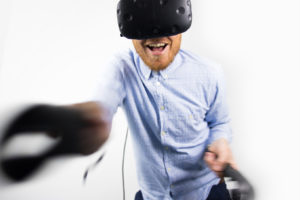 Alex Smalley is a PhD Researcher at the University of Exeter. His research is exploring how immersive digital experiences of nature can impact wellbeing.
Alex Smalley is a PhD Researcher at the University of Exeter. His research is exploring how immersive digital experiences of nature can impact wellbeing.
My PhD is centred around asking “Can technologies like virtual reality bring the natural world to people in ways which benefit their mental health?”
I think that’s an important question to ask because whilst a decent body of evidence shows that spending time in nature can boost health and wellbeing, many people don’t have access to the natural world when they might need it the most.
For people in long term care, those recovering from major surgery, or workers in stressful jobs, contact with nature is often irregular, inadequate or impossible. And whilst immersive technologies give us a way to overcome these barriers, we understand very little about how to design and deliver truly restorative ‘virtual nature’ experiences.
When I wrote my PhD proposal, I had a pretty tight plan for how it would unfold. I knew where the gaps in the literature were; which questions I wanted to ask; and the kinds of experiments I was likely to run.
But 3 weeks before I was about to start, one meeting in Bristol changed everything.
I’ve been part of research at the University of Exeter for several years, and had been collaborating with the BBC Natural History Unit on another virtual reality project. In September 2018 they began work with BBC Radio 4 to produce an ambitious new drama, and wanted to weave science and research throughout the programme.
The new eco-thriller was going to explore our relationship with nature, and would focus on the sounds its protagonist encountered. It would also provide a unique ‘3 part offering’, with each episode of the drama accompanied by a science-based podcast and an immersive soundscape; Forest 404 was born.
The BBC wanted me to help with the science, but how could this fit with my research? Several creative discussions later, we decided to launch a national experiment alongside the drama, asking the British public to help us understand how people respond to the sounds of nature.
My PhD plan was out of the window!
Suddenly I was leading a research partnership between the BBC, the University of Bristol and the University of Exeter, as well as helping the Open University to develop their new citizen science tool (which would host the experiment).
Yet far from throwing my research off course, the Forest 404 Experiment has forced me to think differently about how people experience the natural world. It’s opened my ears to a rich seam of research possibilities, and highlighted nature-based sounds as a research avenue which has been largely overlooked.
Crucially, working with incredible teams at the BBC, Open University and the University of Bristol, has meant that I’ve been able to conduct an experiment which has been created by the very best in the business. It’s also operating on a scale which is unprecedented in soundscape research—we’ve already had over 7,000 people take part across the UK.
But it hasn’t always been easy. I’ve often been gripped by anxiety, imposter syndrome, and straight up panic—there was a week in April when just the Forest 404 theme tune would bring me to tears! But by talking about my research on the radio, in podcasts, and on the TV, I’ve had a chance to raise awareness of the study, and engage with a broad audience we never would have reached otherwise.
I’m also incredibly grateful to my supervisory team, without whom none of this would have been possible.
The take home message? Don’t be afraid to let your research take you in unexpected directions, and grab every opportunity that arises—even if they scare you!
Alex is funded by the Wellcome Trust and based at the University of Exeter’s campus in Truro. You can find out more about Virtual Nature at virtual-nature.com.
